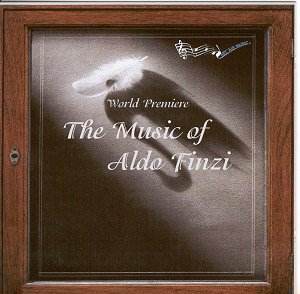The works recorded here span some twenty-five years
of Aldo Finziís composing life and thus offer a fairly comprehensive
survey of his musical journey. His output includes works in almost every
genre: chamber music, orchestral works, some choral-orchestral pieces
such as Salmo of 1944/5 and a comic opera La Serenata al Vento,
some of which is available in commercial recordings. (There is another
Bel Air Music disc with pieces by Aldo Finzi but I have not heard it.)
The short, song-like Berceuse for cello
and piano composed to celebrate the composerís first-born child and
the Pavana for piano are among the earliest pieces in
this selection. The Berceuse still hints at Fauré
whereas the Pavana is a simple, direct piece of music
also redolent of some other French composers. The rather sketchy, though
serviceable, insert notes do not make it clear whether Liriche
per Soprano e Piano were composed as a true cycle or, rather,
were compiled from songs written at different periods of Finziís early
composing career, between 1920 and 1925 (the dates to be found in the
Aldo Finzi website).
Anyway, the literary sources of these simple, often beautiful songs
are quite varied: Maeterlinck and Van Lerberghe as well as Longfellow
(in Italian translation by Finzi), Arturo Graf (no idea who he is) and
Aldo Finzi himself (one song Rondini in Italian and another
Catharine in English). From the musical point of view,
these songs, beautifully written for the voice (the soprano Giuseppina
Finzi Magrini was the composerís aunt), are more like salon music of
quality rather than complex art songs; but they are all quite enjoyable
and some (such as Barque díor on a poem by Van Lerberghe)
are particularly fine.
The Toccata for piano brings similar
pieces by Debussy, Ravel or even Prokofiev to mind, and is a brilliant
virtuoso essay (a potentially popular encore, were it heard more often).
Interludio for chamber orchestra and piano, completed
in 1937, is a curious piece with an enigmatically misleading title.
Indeed, this comparatively austere piece is more like a miniature tone
poem in rondo form. This sphinx-like, sparingly scored piece might well
be the more complex work here in spite of its brevity. In total contrast,
the large-scale symphonic poem Come allíultimo suo ciascuno artista
is an expansive, lushly scored and warmly melodic piece of music of
considerable substance. It develops a couple of contrasted ideas, i.e.
an impassioned first subject and a more relaxed, lyrical second subject
(echoes of Prokofievís Romeo and Juliet). The music represents
a continuous interplay between these subjects. It often rises up to
powerful climaxes. Though it may be partly influenced by Richard Straussís
tone poems, the music has a most welcome sunny Mediterranean lyricism
magnificently enhanced by some wonderful scoring (Bax also came to mind).
A major work that clearly deserves wider currency.
Finally, the short orchestral fantasy Danza
(two pianos, two saxophones and orchestra) is quite at odds with any
of the other pieces. It is a light-hearted, exuberant frolic tinged
with jazzy inflections. Unpretentious, entertaining light music, maybe,
but superbly crafted of which this is the first performance and the
first recording as well.
Finziís music was new to me; but these works certainly
whet my appetite to hear more. It does not break new ground and clearly
belongs to the early 20th century mainstream; but it is superbly
crafted and full of memorable ideas. This well-played and well-recorded
release serves the music well and makes good advocacy for Finziís music.
Hubert Culot
